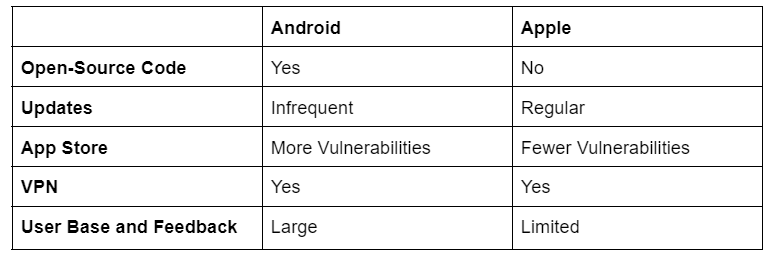When you are looking to enhance the security of your personal smartphone the results can be very different depending on which operating system you are using.
Yes, because despite ever-improving technological advances that help to strengthen security, cyber criminals are also keeping up and attacking our data and networks in a myriad of novel and elaborate ways.
Therefore, if you want to stay ahead of the game, it’s time to review two of the most popular operating systems in the world and find out which one is the best and most secure, both for your personal data and for your business.
Keep reading as we examine the current security rates of Apple’s iOS and Android operating systems.

First of all, it’s worth mentioning that Android is the most used mobile operating system in the world. This, in turn, means that the potential for security threats and issues is higher. However, it also means that its larger community base can cooperate more and better to help improve security in the short and long term.
Android 5, 11, and 12 are currently the OS versions with the lowest number of vulnerabilities. On the other hand, versions 7, 8, and 10 have a much higher amount of those.
Android’s most recent update—number 12—has a very low incidence of potential threats, which is a positive and promising factor as it shows that the company is seriously committed to making enhanced security a priority for all its users.
Some of the best security features of Android 12 include:
The main downsides of this operating system are:
It should come as no surprise that, historically, experts in the sector have always deemed Apple’s iOS to be a more secure system compared to Android. The main reason? It’s almost impossible for a virus to get into your Apple device, unless it’s jailbroken.
The iOS updates with the lowest number of vulnerabilities are iOS 5, 7, and 8. On the contrary, those with more vulnerabilities are iOS 11, 14, and 15.
It’s very apparent that the more recent versions seem to have more potential for vulnerabilities, but why is that? Partly, this increase can be explained by considering the ever-increasing popularity of iPhones, which in turn attracts more cyber criminals to these devices.
Interestingly, Apple’s most secure update to date was iOS 5, released back in 2011. This version only had three big vulnerabilities within the first year of its release, which made it the most secure update of all—both on Apple and Android’s side.
These are some of the best security features of iOS:
Some of the weaknesses, on the other hand, include:

In our digital world, having a highly secure operating system equals greater peace of mind. And while we might spend a lot of time choosing and updating our passwords, there is something else that we must consider: the type of OS that we are using daily.
According to recent data and research, Apple wins as the most secure operating system against its all-time rival Android. The main reason for this lies in Apple’s ability to keep offering frequent and ever-stronger updates to its devices.
Nonetheless, it’s important to mention—and to commend—Android’s everlasting quest for better and more solid security, which can be perfectly exemplified by its latest system update—one of the best yet.
Having said that, data security should always be front of mind regardless of which operating system you are using, which means that you should keep updating your OS frequently, look out for any suspicious activity, and report any breaches immediately.
Author Bio:
Grace Lau is the Director of Growth Content at Dialpad, a cloud phone system and AI-powered communication platform with cloud PBX features for better and easier team collaboration. She has over 10 years of experience in content writing and strategy. Grace has published several articles for various domains including PECB Insights and WITI.